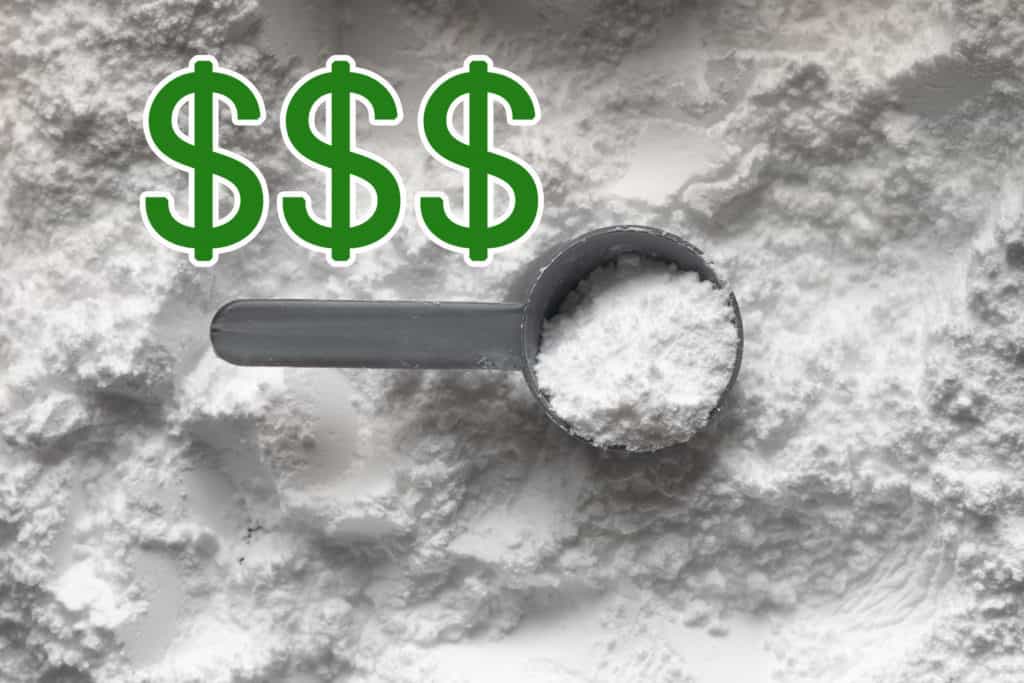
Numerous articles on this website have gushed about the countless benefits creatine supplementation offers. One advantage of creatine supplementation was its low price point. In a world of expensive supplements with questionable results, it’s ironic that the most researched and beneficial supplement was so cheap.
That’s not the case anymore.
Creatine prices have skyrocketed lately. You used to be able to find a small bottle of creatine monohydrate for about $10-15. Not only that, it’s hard to find creatine in general even if you are willing to pay up for it.
Most supplement companies source their creatine from overseas. Due to supply chain issues, creatine prices have soared 30-40% in some brands.
While many supplement manufacturers make the actual products in the United States, the ingredients themselves typically come from elsewhere. Creatine in particular is usually sourced from China. This shortage also applies to alternative forms like creatine hydrochloride (Creatine HCL/Con-Cret) and buffered creatine (Kre-Alkalyn).
Product options seem non-existent as well. Good luck finding a month’s supply of creatine, you’ll have to pay up for a much larger bottle. Whether it’s capsules or powder, no one seems to be immune from this price increase.
Creatine provides a myriad of benefits, from muscle building to strength gains to cognition. These benefits are backed by hundreds of research studies. Creatine works for both men and women. It’s one of the most common parts of any supplement stack, so this price increase has affected millions of people.
Creatine is an energy source that provides ATP rapidly for intense exercise. It also pulls water into the muscle cell, making it larger and more hydrated. Creatine monohydrate is the form that has been studied the most, and has been shown to saturate muscle 100%.
How to Find Cost Effective Creatine
The one positive supplement users can take from this is that out of all ingredients, creatine is the most prevalent in products.
In other words, you don’t have to look for pure creatine monohydrate if you want to get your hands on creatine. It is found as part of many pre-workout and post workout formulas. Some protein powders, like Carnivor, even contain creatine.
For the time being, pre-workout supplements have not experienced as staggering a price increase as commodity creatine products. Finding a pre-workout that contains creatine as part of its formula may be a better, more cost effective strategy than looking for creatine by itself.
The good thing is that a wide variety of pre-workout supplements contain creatine, so it won’t be hard to find in that regard. Most of these products have been around for years, and were formulated at a time where creatine was inexpensive.
It is unlikely that these products will go through any sort of reformulation, as the creatine price increase is hopefully a temporary thing.
Supply chain issues have affected numerous industries, which trickles down to consumers paying more for products or not being able to find products at all.
This has been an eye opening experience for large and small scale companies that rely on others to make their products. A select few supplement companies source creatine domestically. I suspect this to be a new trend moving forward, as it’s better to pay a more to manufacture your own supplements then to have things completely out of your control.
Apart from sourcing ingredients elsewhere, most supplement companies don’t even manufacture their products on-site. Their headquarters are basically a warehouse for storing and shipping supplements, but the supplements themselves aren’t made there. That makes two crucial components of production that are essentially out of their hands.
Of course, it takes money and resources to do everything in-house. But in times like these, it is a massive advantage to have everything under your control.
Recent Posts
Stretching Before Workouts: Essential Warmup or Performance Killer
“Don’t stretch before workouts, your muscles become too supple” “Stretch before your workouts, warming up is important” It's conflicting advice like this that drives people crazy,...
Best Protein Bar For the Money | Cost Effective, High Quality
Protein bars are no longer a supplement dedicated to diehard gym rats, with awful taste and the consistency of a brick. Men, women, and even teenagers can commonly be seen eating protein bars. The...
